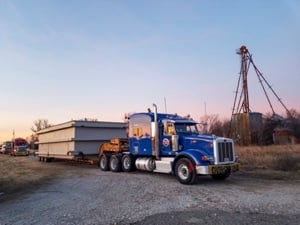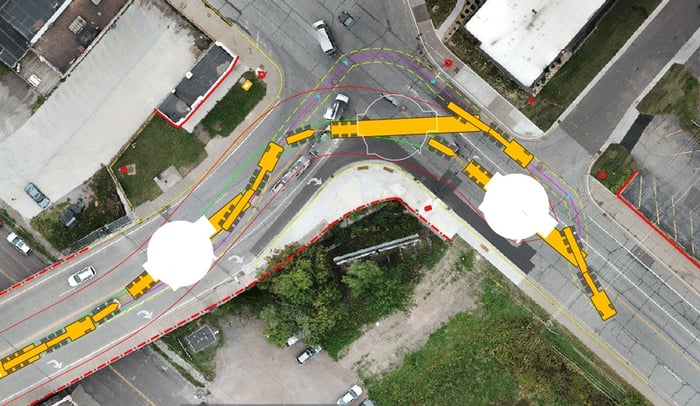 If you're shipping large items that can't legally fit within the dimensions of a standard dry van or open-deck flatbed, and you anticipate your shipments weighing more than 55,000 pounds each, then you need to rely on a heavy haul carrier with trailers that can appropriately scale to your needs.
If you're shipping large items that can't legally fit within the dimensions of a standard dry van or open-deck flatbed, and you anticipate your shipments weighing more than 55,000 pounds each, then you need to rely on a heavy haul carrier with trailers that can appropriately scale to your needs.
While the right heavy haul carrier will help you determine the correct trailer for your load, it's important as a shipper to understand whether or not your shipment will be classified as “heavy haul.” Heavy haul shipping typically requires meticulous planning and expertise — which means additional time needs to be spent upfront compared to more traditional shipments.
In this post we'll explain the main reasons heavy haul shipping requires additional equipment, expertise and planning, and what to look for in a heavy haul carrier.
Why Heavy Haul Shipping and "Lowest-Cost Option" Don't Mix
Each heavy shipment is subject to its own unique challenges. Exact dimensions, weight and destination inform every detail. Because of this, carriers should have a large assortment of trailers in many configurations. "Low cost" carriers will have limited options and expertise, which makes damaged freight and unforeseen delays much more likely.
If you work at a manufacturing company that relies on timely freight, ship construction equipment that needs to arrive on time or are responsible for shipping other large projects that must remain on schedule, “lowest cost" can easily become "highest cost" should a shipment get stuck in transit or arrive damaged.
Heavy Haul Shipping Requires Trailer Diversity
When it comes to heavy haul shipping, it's important to think in terms of inches and pounds.
Permit requirements vary across states and municipalities, and infrastructure limitations could result in inefficient rerouting. Even one additional pound may legally require you to use a trailer with an additional axle. One added inch may mean you need to use a different trailer to obtain a permit to clear an overpass.
When carrying heavy loads, you need trailer options that can safely secure and haul your shipment. For example, your shipment may need additional continuous loading space or different deck heights to accommodate its dimensions. In another instance, you may be shipping a large piece of equipment that needs to drive onto a trailer, which would require a trailer with a removable gooseneck (RGN).
There are a number of heavy haul trailers out there, and each comes in multiple sizes and configurations. Each trailer type can also be ordered with different equipment, including outriggers (extensions that support extra-wide loads), RGNs, extendable decks and low-profile tires that drop the deck height.
Top carriers have more than just a large number of trailers. They have multiple trailer options and various ways to customize their trailers. The best carriers can make the small tweaks and adjustments that ensure your shipments get from point A to point B as safely and efficiently as possible.
Heavy Haul Shipping Requires Well-Maintained Trailers
It's not enough to just have the right type of trailing equipment. Safety in the trucking industry is greatly improved when rigorous maintenance schedules are put in place and part of a core corporate imperative.
As a shipper, you should ask heavy haul carriers how often they maintain their trailers and where the maintenance takes place. Many reputable carriers ensure detailed inspections are conducted at their own maintenance facilities at least once per year. Because carriers know their trailers better than anyone else, regular inspections and maintenance conducted by the carrier will keep trailers on the road for longer.
Before choosing a heavy haul carrier ask them how old their trailers are or how often they purchase new trailers. At ATS, for example, we have a 10-year trailer plan that says trailers shouldn't be in service for more than 10 years, and we replace roughly 10 percent of our fleet every year. This is so we can more easily incorporate the latest technologies into our trailers and help you avoid costly breakdowns.
Heavy Haul Shipping Requires Well-Trained Drivers
It's crucial that the heavy haul carrier you partner with has a rigorous, hands-on training program that incrementally allows Drivers to advance.
The Drivers who haul the largest trailers in the industry are highly skilled career professionals for good reason. It's a difficult job that requires years and years of training and skills development — these Drivers have to quickly react to challenges in order to protect your over-dimensional shipments and public safety.
The best carriers extensively train Drivers at each step. As Drivers develop and gain experience, there are milestones they need to meet and tests they need to complete before they're able to progress to haul a larger trailer with more axles.This training ensures that they're highly qualified before they move your over-dimensional shipment.
If a Driver works for a reputable carrier like ATS, it's common for them to have more than 20 years of experience and 2 million miles under their belts before they get into heavy haul shipping.
To ensure all Drivers receive the best training, carriers should have designated "coaches" that sit with them to review onboard camera footage and discuss what they could have done differently. By using onboard cameras, carriers use feeds to improve education around things like following distance, the execution of turns and more. The exercise is similar to when coaches and players watch footage of games to improve future performance.
Heavy Haul Shipping Requires Deep Expertise and a Team Approach
Expertise and approach separate the best heavy haul carriers from the rest. Having highly skilled Drivers and a variety of well-maintained equipment is necessary. Drivers can't do their jobs unless there are multiple parties that seamlessly coordinate and plan the best approach.
In addition to having capable sales, customer service and safety teams, the best heavy haul carriers will also have separate teams dedicated to:
- Permitting: Instead of relying on third-party vendors to secure permits, the right carrier will have a team in-house that is dedicated to securing permits for their trucks. This team will have detailed internal knowledge of what permits your shipment requires based on its size, weight and destination. The team will also know how long it takes to secure permits, how long they're good for and how much they cost.
- Route management: If a carrier is keeping this crucial planning step in-house, it should include extensive route planning, which typically starts at least 30 to 60 days prior to your shipment hitting the road. During planning, route surveys are conducted to identify potential obstacles, such as construction sites or infrastructure limitations. Technology should also be leveraged to help with planning. For example, CAD files should be overlaid onto Google Earth maps to determine whether heavy haul trailers can navigate certain routes and execute turns.
 Example showing how the ATS route management team uses Google Earth maps and CAD files to determine whether a trailer can execute turns within a route.
Example showing how the ATS route management team uses Google Earth maps and CAD files to determine whether a trailer can execute turns within a route.
Heavy haul carriers with permitting departments will know exactly how to overcome permitting issues and whom to call because they troubleshoot issues every day and have a proven history of dealing directly with states and municipalities.Third party permitting companies don't have this experience, and they don’t hold the same level of knowledge about your equipment, business or customers.
In-house route management prevents major shipment delays and nearly eliminates mid-route surprises. It also helps identify all requirements and costs upfront. For example, in most states, an escort is required for shipments over 12 feet wide, and police escorts are needed if a shipment exceeds 16 feet wide. These escorts will increase the cost of your shipment, and in-house route management ensures you'll be able to plan for this cost ahead of time.
Because there are so many variables at play in heavy haul shipping, partnering with a carrier that has the expertise to plan properly will save you time and money.
Heavy Haul Shipping Solutions Must Be Comprehensive
As someone who ships heavy, over-dimensional loads, you need:
- Equipment that won't fail with features that are right for your needs
- Thoroughly trained Drivers who are supported by teams of experts
If you receive anything less from your carrier, you're likely to have the wrong equipment show up, receive inefficient routing guidance, have shipments get stuck in transit, see more instances of damaged freight, experience more overall inefficiencies and waste more money.
At ATS, our heavy haul capabilities are expansive. We have a wide range of well-maintained equipment, as well as dedicated permitting, routing, safety and customer service departments who collaborate seamlessly to help you avoid challenges, no matter how complex your over-dimensional shipment is.
That's why we have more than 65 years of experience successfully executing complex heavy haul shipments using the safest, most efficient routes.
Are you looking for an expert heavy haul carrier to deliver success for your next heavy haul project? Reach out and request a quote today.



